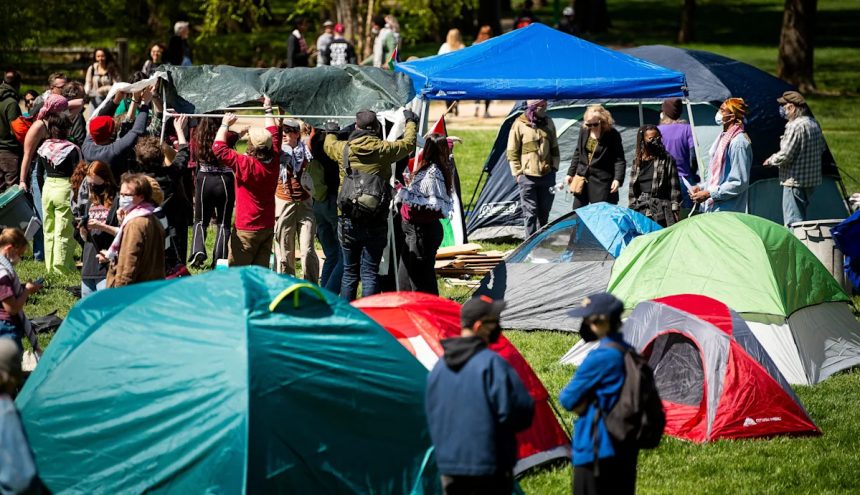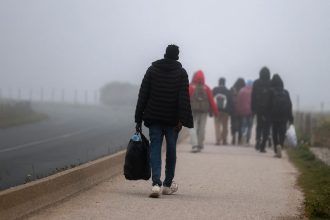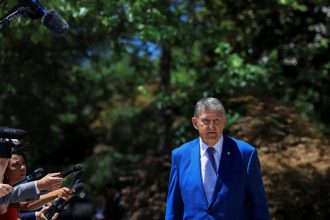When a national First Amendment nonprofit ranked Indiana University the worst public college in the country for fostering and protecting free speech on campus, it cited a number of incidents that it said infringe on First Amendment rights and damage students’ trust.
The Foundation for Individual Rights and Expression, a nonpartisan organization that defends First Amendment rights across the political spectrum, and survey company College Pulse rank the campus speech environment of 257 public and private universities each year.
IU was ranked 255 out of 257 schools, only scoring better than New York’s Columbia University and Barnard College — both private colleges.
FIRE cited a number of IU actions and incidents targeting viewpoints across the political spectrum that were cause for concern. Here are six that led to IU’s unsavory title:
Response to Palestine solidarity encampment
In spring 2024, a Palestine solidarity encampment stood for months in Dunn Meadow as part of a movement of solidarity encampments erected at universities across the country.
On multiple occasions, pro-Palestinian protesters clashed with state police and saw their tents torn down.
Over two days, over 50 people were arrested, largely for criminal trespass and resisting law enforcement. Two months later, all criminal charges were resolved or dismissed.
In a new FIRE survey, some students said they felt the university was trying to prevent students from speaking out on the Israel-Gaza war and other controversial topics. Many said they feared punishment for attending protests or posting on social media.
Students also raised concerns about the presence of snipers atop campus buildings.
“When we tried to have encampments, our university pointed snipers at students to scare us away,” one student respondent said. “It was dangerous and unsafe.”
Policy ruled to likely violate the First Amendment
In mid-2024, IU changed its “expressive activity” policy to ban overnight camping and use of structures, such as tents, without approval — hallmarks of the pro-Palestine protest movement.
Under the debated section of the policy, students, faculty and staff could not engage in protests and other expressive activities from 11 p.m. to 6 a.m. without permission. If violated, one could face a range of disciplinary actions, including suspension, expulsion and loss of university employment.
However, Judge Richard Young of the U.S. District Court for the Southern District of Indiana paused the policy, ruling it was likely violating students’ First Amendment rights.
During a June meeting, the board of trustees unanimously agreed to revise the policy and remove the prohibition on overnight protesting and other expressive activities. It also added language saying the policy should be “interpreted in favor of free speech rights.”
Palestinian artist’s exhibition canceled
In late 2023, the IU administration decided to cancel the planned on-campus exhibition of IU alumna and Palestinian-born artist Samia Halaby. Her first American retrospective, “Centers of Energy,” was in the works at IU’s Eskenazi Museum of Art for more three years.
IU Provost Rahul Shrivastav said during a Faculty Council meeting in January 2024 that Halaby’s exhibit was canceled due to safety and security concerns. Shrivastav described the cancellation as the “best of two undesirable options” but didn’t provide evidence or reference specific threats.
The decision drew criticism from IU faculty, students and free-speech advocates, as many speculate that Halaby’s pro-Palestinian views were the underlying reason.
The controversy was coupled with the suspension of IU professor Abdulkader Sinno for a mistake when helping a student group host an event on campus. Sinno was suspended for bypassing formal procedure when he assisted the Palestine Solidarity Committee in organizing a public event on the Israel-Hamas war.
Pro-Israel speaker postponed without rescheduling
Citing security issues, IU asked its Hillel center to postpone an April 2024 talk with Mosab Hassan Yousef, a Palestinian critical of Hamas who was an informant for Israeli security agencies. The event has not been rescheduled.
The Palestine Solidarity Committee and the Middle Eastern Student Association criticized Yousef for his remarks about Muslims, and a counter-protest was planned to demand that the university not host “advocates of Islamophobia,” the Indiana Daily Student reported.
In an X post in response to the postponement, Yousef said, “This is how the Muslim minority in America exploits freedoms to intimidate and silence their political opponents.”
LGBTQ+ Health Care Conference canceled
The Indiana University School of Medicine canceled its LGBTQ+ Health Care Conference less than three months before the event was to take place without explanation.
Chris Geidner, a journalist and legal expert who covers LGBTQ+ and other issues at the U.S. Supreme Court, says he was invited to be a keynote speaker at the 2025 conference just two days before he was informed it would not be held.
Geidner says the abrupt cancellation, without reason, led him to believe efforts aimed at targeting diversity, equity and inclusion initiatives across the U.S. and in Indiana played a role.
Indiana University and the IU School of Medicine did not respond to a request for comment at the time.
Conservative speakers targets of ‘mob censorship’
In April 2024, Indiana University police officers detained two protesters for standing and shouting during a lunchtime discussion featuring then-U.S. Rep. Jim Banks and TikTok influencer Chaya Raichik, known online as “Libs of TikTok.”
Raichik, a right-wing media personality, and Banks hosted a Q&A-style event presented by College Republicans at IU. The event was attended by both apparent supporters of Raichik and Banks and several dissenters, who asked them questions about the definition of “wokeness,” LGBTQ+ education in classrooms, and Raichik’s role on the Oklahoma library advisory committee.
During the event at the IMU, two protesters shouted, “How many kids have you killed today?” at Raichik and Banks.
FIRE condemns shouting down speakers for their views, calling the act “mob censorship.” The organization says the act allows loud individuals to dictate what people can or cannot hear, which they say “is especially egregious for this to happen in the university context where the free exchange of ideas and the freedom to seek out any information is most important.”
Following the event, College Republicans of IU said on Instagram, “Despite numerous attempts to SHUT DOWN the event, College Republicans SUCCESSFULLY hosted Jim Banks and Chaya Raichik today.”
The USA TODAY Network – Indiana’s coverage of First Amendment issues is funded through a collaboration between the Freedom Forum and Journalism Funding Partners.
Have a story to tell? Reach Cate Charron by email at ccharron@indystar.com, on X at @CateCharron or Signal at @cate.charron.28.
This article originally appeared on Indianapolis Star: Why Indiana University ranked as worst public college for free speech









